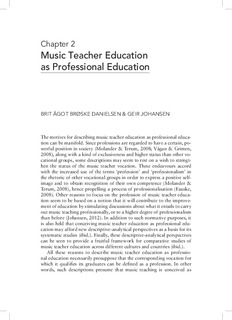| dc.description.abstract | The motives for describing music teacher education as professional education can be manifold. Since professions are regarded to have a certain, powerful position in society (Molander & Terum, 2008; Vågan & Grimen, 2008), along with a kind of exclusiveness and higher status than other vocational groups, some descriptions may seem to rest on a wish to strengthen the status of the music teacher vocation. These endeavours accord with the increased use of the terms ‘profession’ and ‘professionalism’ in the rhetoric of other vocational groups in order to express a positive selfimage and to obtain recognition of their own competence (Molander & Terum, 2008), hence propelling a process of professionalisation (Fauske, 2008). Other reasons to focus on the profession of music teacher education seem to be based on a notion that it will contribute to the improvement of education by stimulating discussions about what it entails to carry out music teaching professionally, or to a higher degree of professionalism than before (Johansen, 2012). In addition to such normative purposes, it is also held that conceiving music teacher education as professional education may afford new descriptive-analytical perspectives as a basis for its systematic studies (ibid.). Finally, these descriptive-analytical perspectives can be seen to provide a fruitful framework for comparative studies of music teacher education across different cultures and countries (ibid.). All these reasons to describe music teacher education as professional education necessarily presuppose that the corresponding vocation for which it qualifies its graduates can be defined as a profession. In other words, such descriptions presume that music teaching is conceived as professional practice, and that music teachers are regarded as the executors of that profession. In this chapter we will start by suggesting and discussing some ways in which music teaching can be described as a profession. Thereafter the question of understanding music teacher education as professional education will be addressed. Finally some implications for the future development of that education will be drawn. | no_NO |
